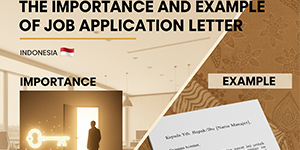The Importance and Example of Job Application Letter Indonesia
In the current competitive job market, a strong resume is often the first step to securing an interview, but landing your dream job requires much more than an impressive CV. An effective job application letter, additionally referred to as a cover letter, nevertheless remains one of the most essential elements of an effective employment prospect. As your personal introduction, this provides you a chance to express yourself to the supervisor directly and is your first real chance for demonstrating off your personality and abilities for the position of employee.
While many applicants treat the job application letter as optional, the reality is that a compelling and thoughtfully written cover letter can set you apart from dozens or even hundreds of other candidates. It shows hiring managers that you are genuinely interested, proactive, and ready to put forth effort diligently to show them why you should be an integral component of their organization. More importantly, this makes your application more personal, so companies may acquire an improved understanding of who you are beyond the bullet points on your professional document.
A strong application letter can be your gateway to securing an interview, building a positive first impression, and ultimately positioning yourself as the ideal candidate. This article will further explain why the job application letter remains so influential and how mastering it can significantly increase your chances of landing your dream job.
Definition Job Application Letter
A job application letter, also known as a cover letter, is a formal written document submitted alongside a resume or CV when applying for a job. Unlike the resume, which focuses on listing skills, experiences and achievements, the application letter provides a narrative that connects your background directly to the position you’re applying for. It allows you to introduce yourself in a more personal and expressive way, explain your interest in the role and highlight the unique qualities that make you a strong candidate.
The main purpose of a job application letter is to persuade the employer that you are the ideal match for the position. This is done by summarizing your most relevant abilities, sharing examples of your accomplishments, and communicating your enthusiasm for joining the company. A well-written letter also demonstrates your written communication skills an important factor in many professions.
When carefully crafted, a job application letter can create a positive first impression, strengthen your overall application, and significantly increase your chances of being invited to an interview. Employers often review cover letters to assess professionalism, attention to detail, and the applicant’s ability to express themselves clearly. Because of this, taking the time to prepare a strong application letter can make a meaningful difference in the recruitment process.
Example of Job Application Letter in English
Writing a job application letter in English is especially important for candidates applying to international companies, multinational organizations, or workplaces where English is the primary language of communication. Using clear grammar, proper structure, and a professional tone helps ensure your message is both easy to understand and impactful, regardless of who reads it.
A great application letter in English should sound confident but polite, enthusiastic but professional. Non-native English speakers may need to pay extra attention to spelling and grammar, so careful proofreading or the use of language-checking tools is highly recommended. This helps ensure that your letter leaves a strong impression and reflects your attention to detail.
Most effective job application letters follow a clear structure:
1. Introduction: Start by briefly introducing yourself and explaining how you found the job opening. Mention the specific position you are applying for and give a short statement about why you are interested. This helps the employer immediately understand your purpose.
2. Body: The body section is where you highlight your most relevant skills, experiences, and achievements. Connect your background directly to the job requirements and show how your expertise can benefit the company. Using specific examples such as past projects, accomplishments, or responsibilities can make your letter more convincing and memorable.
3. Closing: End the letter by reaffirming your interest in the role, expressing your appreciation for the employer’s time and indicating your availability for an interview. A respectful and confident closing helps reinforce your professionalism and encourages the hiring manager to move you to the next stage.
Job Vacancy in English
Job vacancies and application letters requiring English proficiency are widely available, especially in sectors like technology, education, tourism, customer service, and international business. These roles are often found through online job portals such as LinkedIn and Indeed, company websites, and recruitment agencies.
English-speaking professionals are in demand for positions like software developers, English teachers, and customer service representatives, particularly in multinational companies and tourism hubs. In non-English-speaking countries, such as Indonesia, both locals and foreigners can find opportunities in international businesses, education, and hospitality sectors.
Making a professional job application letter with a resume in English that highlights your language competence and relevant talents is crucial if you want to apply for a job in an English-speaking country. Job vacancies in English give job seekers can improve their chances of landing these roles by concentrating on industries that prioritize English fluency and by employing successful application techniques.
 |
Job Vacancy in IndonesiaIndonesia is a desirable location for job seekers because of its abundance of job possibilities in diverse industries. Manufacturing, technology, travel, banking, and agriculture are important industries. Particularly the expanding IT industry is attracting interest with its prospects in data analysis, software development, and digital marketing. The job vacancy example in Indonesia in the hospitality sector, particularly in well-known travel hubs like Jakarta and Bali.
|
Foreigners, especially English speakers seeking jobs in Indonesia, may explore Vacancies in areas such as education, hospitality, and large companies. English teaching remains one of the most common job opportunities for expats, while international businesses in Jakarta and other major cities seek bilingual employees for roles in management, customer relations, and more.
To find job vacancies in Indonesia, candidates can use online job portals like JobStreet, LinkedIn, and Indeed Indonesia, or explore company websites, recruitment agencies, and professional networks.
Overall, job seekers and jobs in Indonesia for English speakers can find intriguing prospects in Indonesia's dynamic economy. The growing job market in the nation offers rewarding careers to both foreigners and locals who tailor their applications, use efficient job search techniques, and focus on appropriate areas.
Learn more about Top Sites for High-Paying Freelance Jobs Online in Indonesia.
The Role of a Strong Job Application Letter
A strong job application letter is more than just a formality, it’s a strategic communication tool that can determine whether you move forward in the hiring process. It reflects your professionalism, demonstrates your genuine interest in the role and shows the employer that you’ve taken the time to understand their company and values. In competitive job markets where companies receive dozens or even hundreds of applications for a single position, your cover letter becomes the first chance to differentiate yourself. With a compelling introduction and relevant details, you can persuade the employer to take a closer look at your CV and consider you as a serious candidate. Here are several reasons why a strong job application letter is essential:
- It Personalizes Your Application: Employers don’t hire based solely on qualifications they hire people who bring the right mindset, personality, and value to the team. A well-written cover letter allows you to show your voice, enthusiasm, and unique strengths. You can clearly connect your experience to the company’s needs, helping employers visualize you as part of the team.
- It Shows Attention to Detail: Customizing your cover letter for each position proves that you are thoughtful, responsible and committed. It signals that you didn’t just send out a generic application but made the effort to understand the company’s goals, culture, and job expectations. This attention to detail can set you apart from applicants who rely solely on their resumes.
- It Highlights Key Strengths: While your resume lists your skills and experience, a cover letter adds depth by explaining the “why” and “how.” You can give examples of achievements, explain the impact you made in previous roles, and draw attention to the experiences that align most closely with the job. This helps employers quickly see your added value and potential contributions.
- It Provides an Opportunity to Address Gaps or Concerns: A resume doesn't always tell the full story. If you have employment gaps, changed careers, or have qualifications that don’t exactly match the job description, your cover letter is the ideal place to address these areas. You can provide context, show personal growth, or highlight transferable skills that demonstrate your readiness and willingness to learn.
A powerful job application letter not only strengthens your overall application but also builds confidence in the employer that you are the right fit professionally and personally for their team.
How to Write Application Letter
Now that you understand why an application letter matters, the next step is learning how to write one that truly stands out. A strong application letter not only introduces you to an employer but also highlights your strengths, personality, and potential fit for the role. Below are essential elements to help you craft a compelling, professional, and impactful letter:
1. Tailor the Letter to the Job: Your application letter should never feel generic. Personalization is key. Avoid using the same template repeatedly without adjusting it to each position. Instead, study the job posting carefully and ensure your letter reflects the specific role you’re applying for.
Include:
- The exact job title
- The company name
- Key skills or qualifications mentioned in the job description
By doing this, you show the employer that you took time to understand their needs and that you’re genuinely interested in their opportunity, not just any job.
2. Create a Compelling Opening: The opening of your application letter sets the tone. Employers often skim dozens of applications, so your first few lines should quickly capture their attention.
Begin with:
- How you discovered the position
- Why the role interests you
- A brief highlight that makes you instantly relevant
Example: “I was excited to come across the Digital Marketing Specialist position at [Company Name]. With over five years of experience leading successful online campaigns, I am confident my skills align closely with your team’s needs.”
This kind of opening immediately positions you as a strong candidate with relevant experience and authentic enthusiasm.
3. Highlight Relevant Skills and Experiences: The body of your letter is your chance to make a strong case for why you’re the right fit. Focus on specific skills, achievements, and experiences that match the job description. Keep your examples measurable, relevant, and brief.
For instance:
- If the job stresses leadership, mention a team or project you successfully led.
- If the role values problem-solving, share an example of a challenge you overcame at work.
- If communication skills are essential, describe how you’ve effectively engaged clients, stakeholders or team members.
The goal is to paint a clear picture of your value supported by real results and not just claims.
4. Show Passion for the Role: Employers want more than just skill they want candidates who genuinely care about the work. Use this section to express enthusiasm and clarify why the position is a meaningful step in your career.
You may mention:
- What excites you about the company’s projects or mission
- Why this role aligns with your long-term goals
- How you see yourself contributing to the company’s growth and culture
Authentic passion helps you stand out from applicants who sound robotic or overly formal.
5. Close with a Strong Call to Action: Your closing paragraph should leave a positive, confident impression. Politely encourage next steps and make it clear you’re open to further discussion.
You can:
- Express interest in an interview
- Mention any attached documents (resume, portfolio, certificates)
- Thank the employer for their time
Example: “I would welcome the opportunity to further discuss how my experience and skills can contribute to your team. Thank you for taking the time to review my application.”
A strong closing reinforces professionalism and signals readiness to move forward.
Common Mistakes to Avoid in a Job Application Letter
Even an excellent candidate can be overlooked if their cover letter contains avoidable errors. Your application letter is often the first document hiring managers see, which means every word matters. To help you make a stronger impression, here are the most common mistakes you should avoid and why they matter:
- Generic Letters: One of the biggest mistakes applicants make is sending the same cover letter to multiple companies. Recruiters can easily spot generic openings, vague descriptions, or irrelevant details. Tailor every letter to the specific job, referencing the role, the company name, and relevant responsibilities. Personalization shows genuine interest and effort.
- Typos and Grammatical Errors: Your cover letter is a reflection of your professionalism. Spelling mistakes, incorrect punctuation and grammar issues can cause hiring managers to question your attention to detail. Always proofread your letter or ask someone else to review it before sending. A clean, polished document sets you apart immediately.
- Repeating Your Resume: A cover letter shouldn’t be a copy-and-paste version of your resume. Instead, think of it as a storytelling tool. Expand on your best achievements, explain challenges you overcame, or highlight relevant skills with context. This is your chance to provide a deeper look into your experience rather than listing the same bullet points.
- Overly Formal or Casual Tone: Tone matters more than most candidates realize. Language that is too formal can sound stiff and impersonal, while overly casual writing can come across as unprofessional. Aim for a tone that is confident, friendly and respectful professional, but still human.
- Lack of Evidence or Examples: Many applicants make claims like “I am hardworking” or “I am a fast learner,” but forget to prove it. Use brief examples to show how you demonstrated those qualities. Evidence makes your letter believable and memorable.
- Writing Too Much or Too Little: A cover letter that’s too wordy can lose the reader’s interest, while one that’s too short may feel rushed or incomplete. Aim for clear, concise paragraphs that communicate your value without overwhelming the hiring manager.
Why Your Dream Job Depends on Your Application Letter?
Your job application letter is far more than just a required document it is often the first real interaction you have with a potential employer. Before they meet you, hear your voice or read your full resume, they will read your cover letter. This makes it the moment where your first impression is formed and in a competitive job market, that first impression can determine whether you move forward or get overlooked entirely.
A strong, well-written application letter accomplishes several important goals:
- It highlights your most relevant qualifications in a personalized way. Instead of simply listing job duties, your letter allows you to connect your experiences directly to the employer’s needs. It lets you explain why your background fits their expectations and how your previous accomplishments can bring value to their team.
- It shows that you understand the job and the company. Hiring managers want to see that you’ve done your research that you understand the company culture, the mission, and the specific responsibilities of the role. When you demonstrate this knowledge, it signals professionalism, genuine interest, and a higher level of commitment than applicants who send generic letters.
- It demonstrates the unique value you can contribute. Your cover letter is the perfect place to explain what sets you apart from other candidates. Maybe you have a special skill, a unique background, or a personal passion that aligns with the role. The letter allows you to show not only what you can do, but what you can bring to the organization that others may not.
Beyond these core functions, your application letter also plays a key role in shaping your overall professional image. It reflects your communication skills, your writing ability, your attention to detail, and your understanding of workplace expectations all qualities employers care deeply about.
Because of this, your cover letter becomes a powerful tool that can influence everything that comes next. A compelling application letter can lead to:
- Interview invitations
- Positive first impressions during screening
- Stronger negotiation opportunities
- Higher chances of receiving a job offer
Think of it as your personal marketing message. It introduces your strengths, explains your motivation, and positions you as someone who is already thinking like a future team member. When you craft a thoughtful, intentional, and well-structured application letter, you show employers that you are serious about the role and that you bring both professionalism and potential.
If you truly want to secure your dream job, you cannot rely on a short, simple or generic letter. You need to write a meaningful and strategic application letter that speaks directly to the employer. When done correctly, this one document has the power to open doors, elevate your opportunities, and shape the next chapter of your career.
Tips to Work From Anywhere: Remote Jobs Vacancies for Indonesians.
Conclusion
The importance of a well-written job application letter cannot be emphasized enough in today’s increasingly competitive job market. With employers receiving dozens even hundreds of applications for a single role, your letter becomes far more than a formality. It acts as your personal representative, offering a first glimpse into who you are not only as a professional but also as a potential team member. A thoughtfully crafted application letter showcases your qualifications, your enthusiasm and your understanding of the position and the company. More importantly, it demonstrates effort, attention to detail and genuine interest qualities employers value deeply.
A strong application letter is effective because it tells a story. It connects your past experiences to future possibilities, helping employers visualize the value you can bring to their team. Instead of simply repeating your resume, it adds context, emotion, and relevance. By customizing your letter for each opportunity, highlighting key accomplishments and addressing the needs of the employer, you present yourself as a candidate who truly understands the role. Avoiding common mistakes such as generic statements, unclear structure, or overly formal tone can further elevate your message and set you apart from other applicants.
Every detail matters: your opening paragraph, the way you express your motivation, the examples you choose to share, and even the closing lines that leave the final impression. When crafted with intention, your application letter becomes an influential tool that can shape how employers perceive you before the interview even begins. It is often your first chance to demonstrate professionalism, communication skills, and readiness for the position.
As you embark on your job search journey, remember that meaningful opportunities are closer than they may seem. With patience, preparation, and a thoughtful approach to your application letter, you can create momentum that leads to interviews, career growth, and personal fulfillment. Embrace each step with confidence, refine your narrative as you go, and stay true to what makes you unique as a candidate. Every application you submit is a chance to move one step closer to your ideal role.
Your dream job is not just a distant goal it is a real destination waiting for the right moment to open its doors. Approach the process with clarity, purpose, and enthusiasm, and let your application letter reflect your passion and potential.
Your next career chapter is ahead, believe in it and let your words lead the way.
Read More: Application for Leave of Absence Due to Medical Treatment
Read More: Writing Winning Job Application Letter: Tips and Advices





